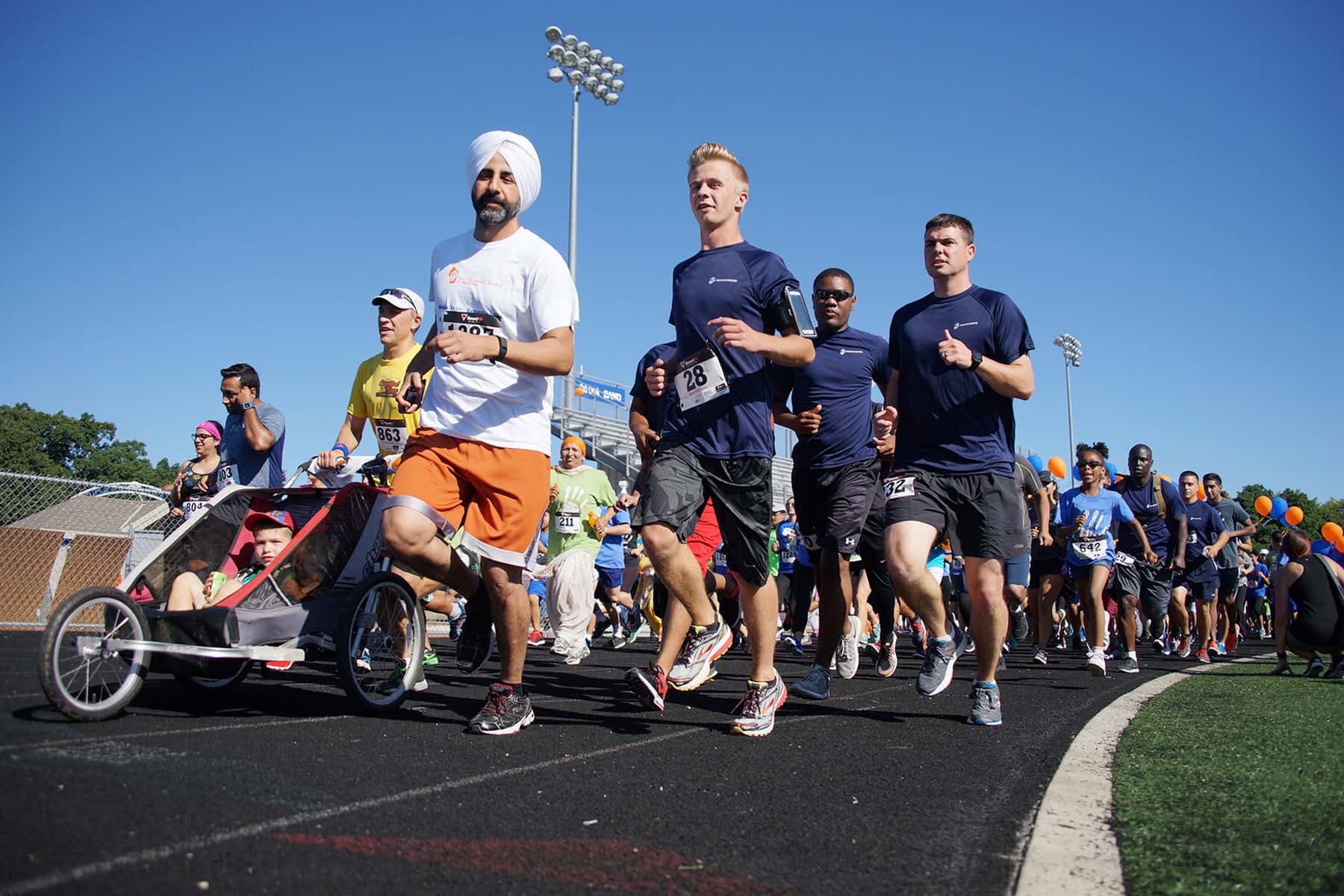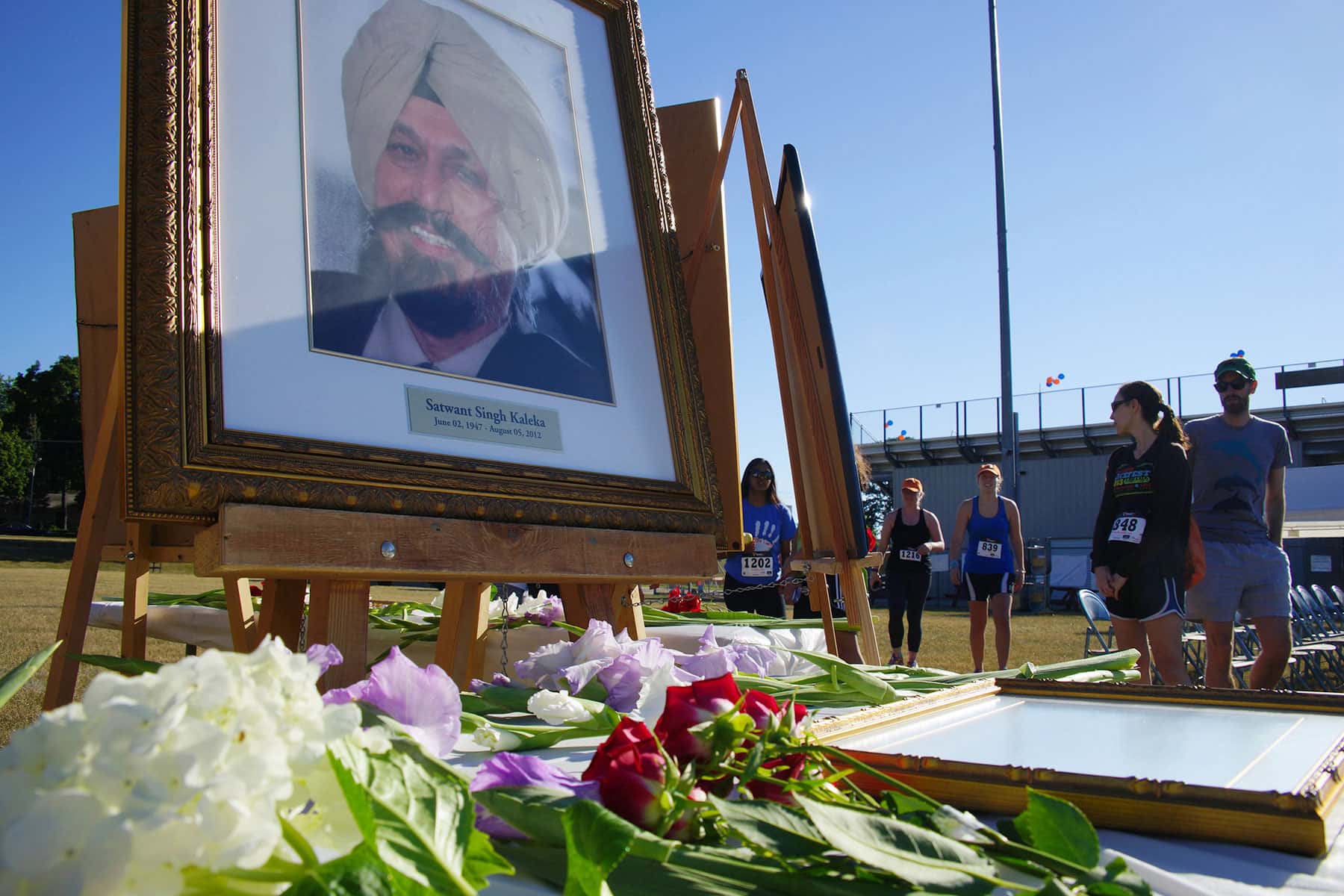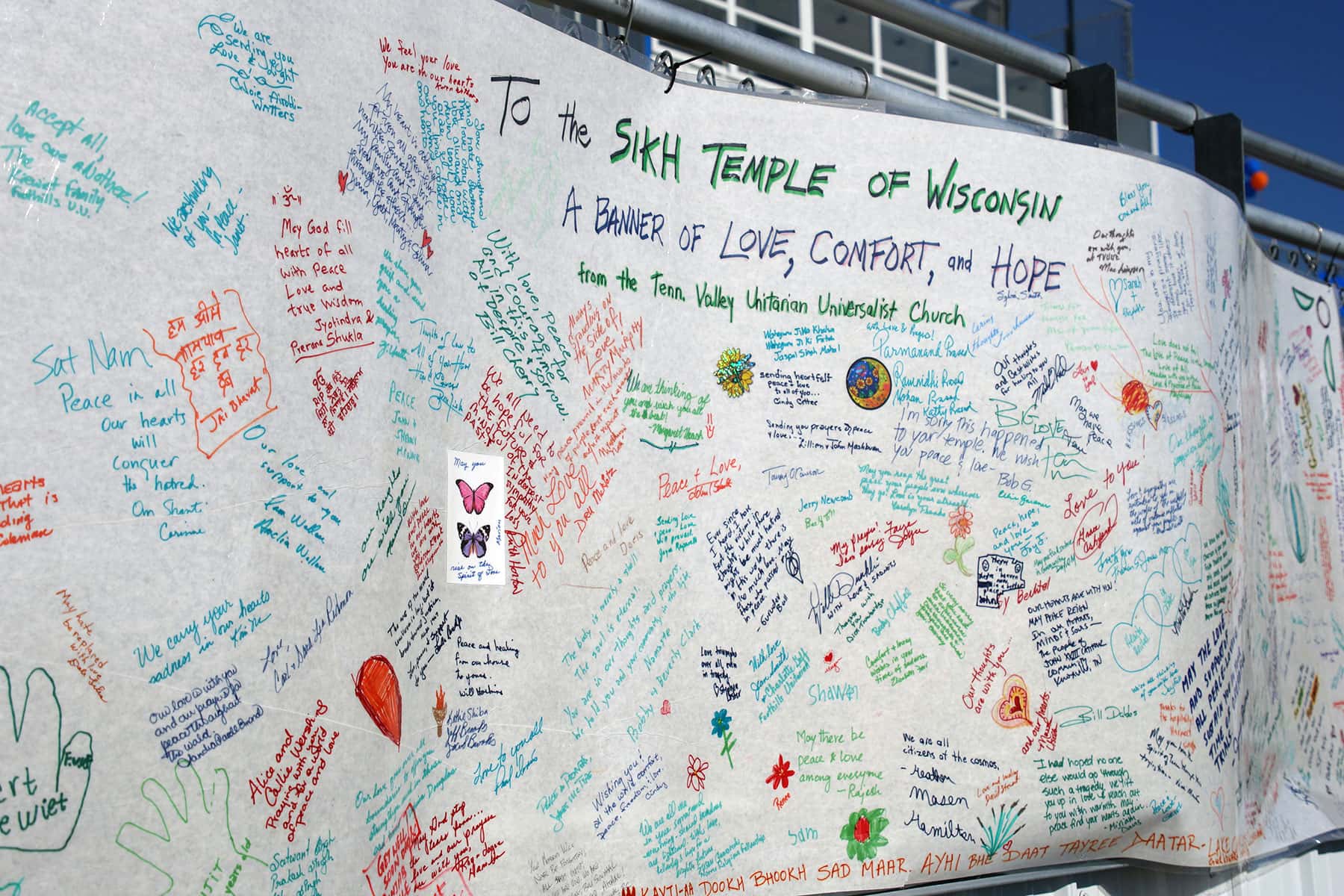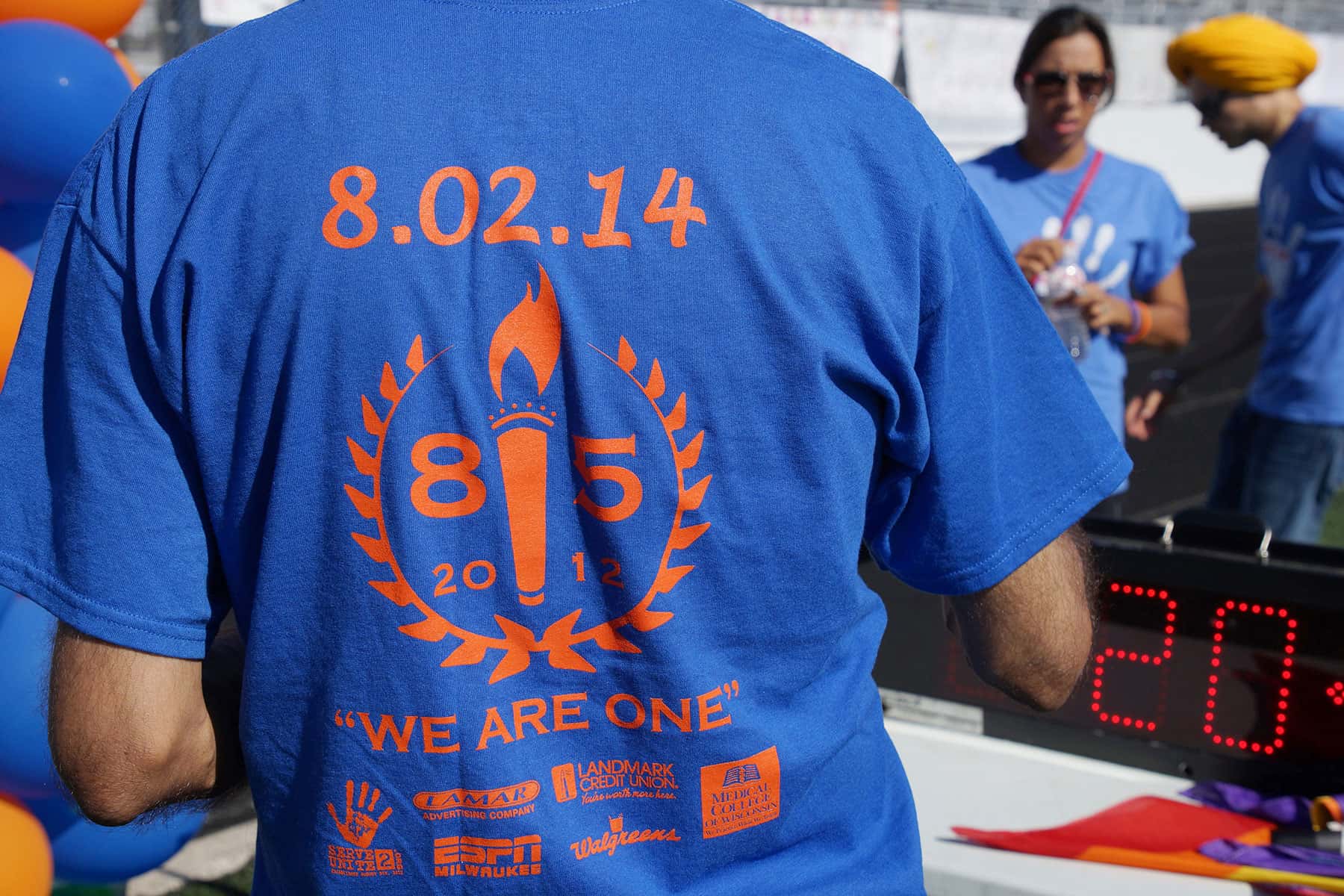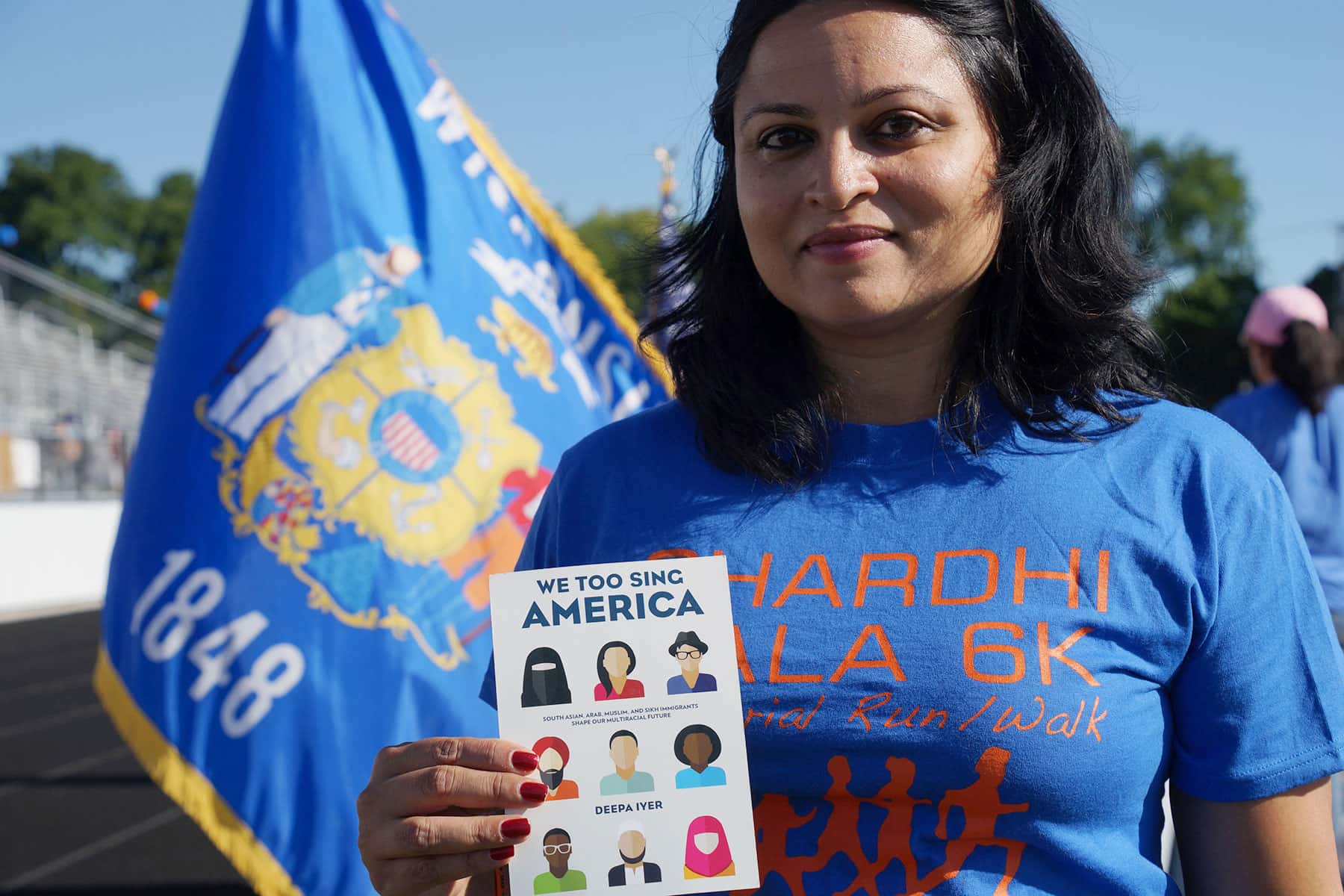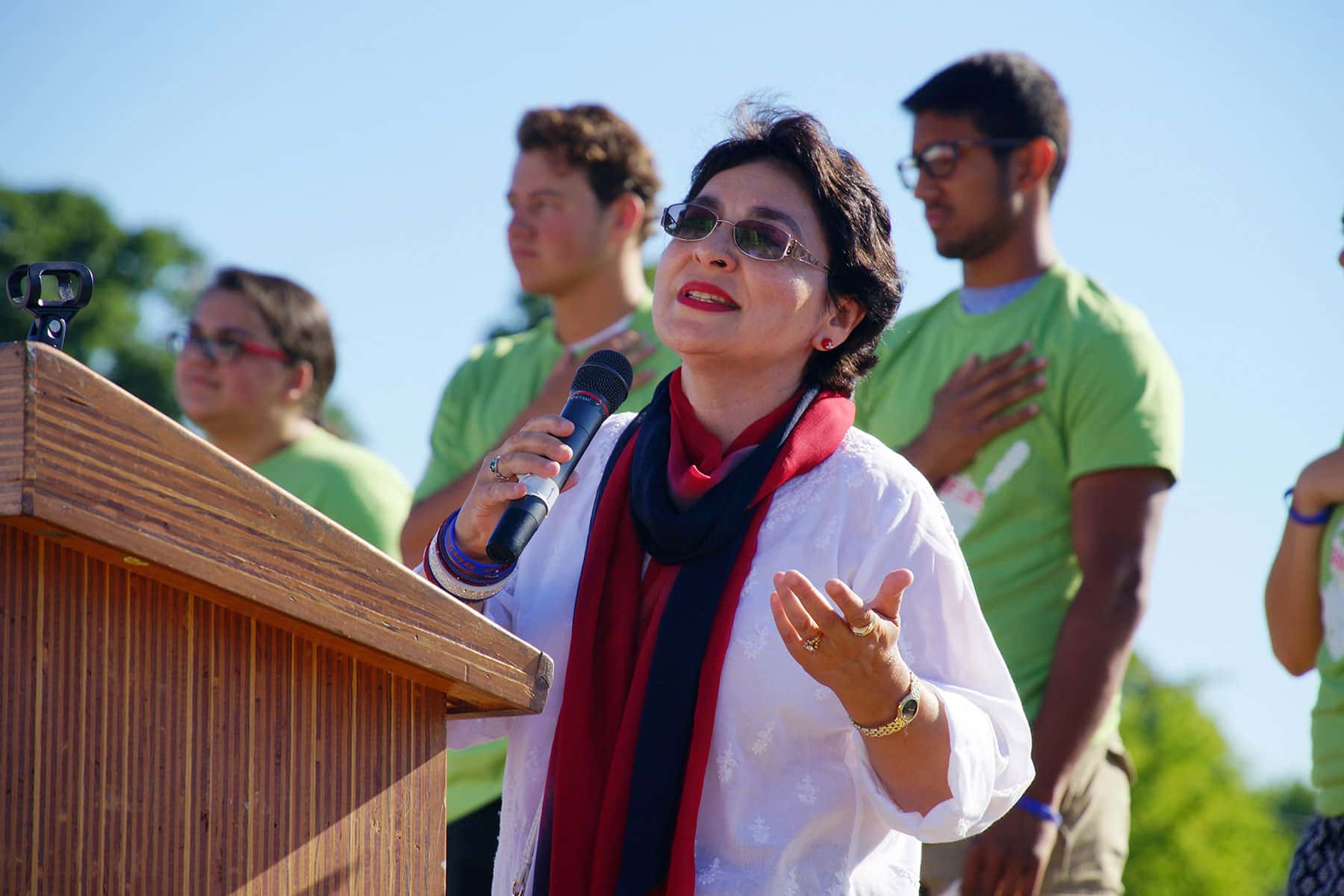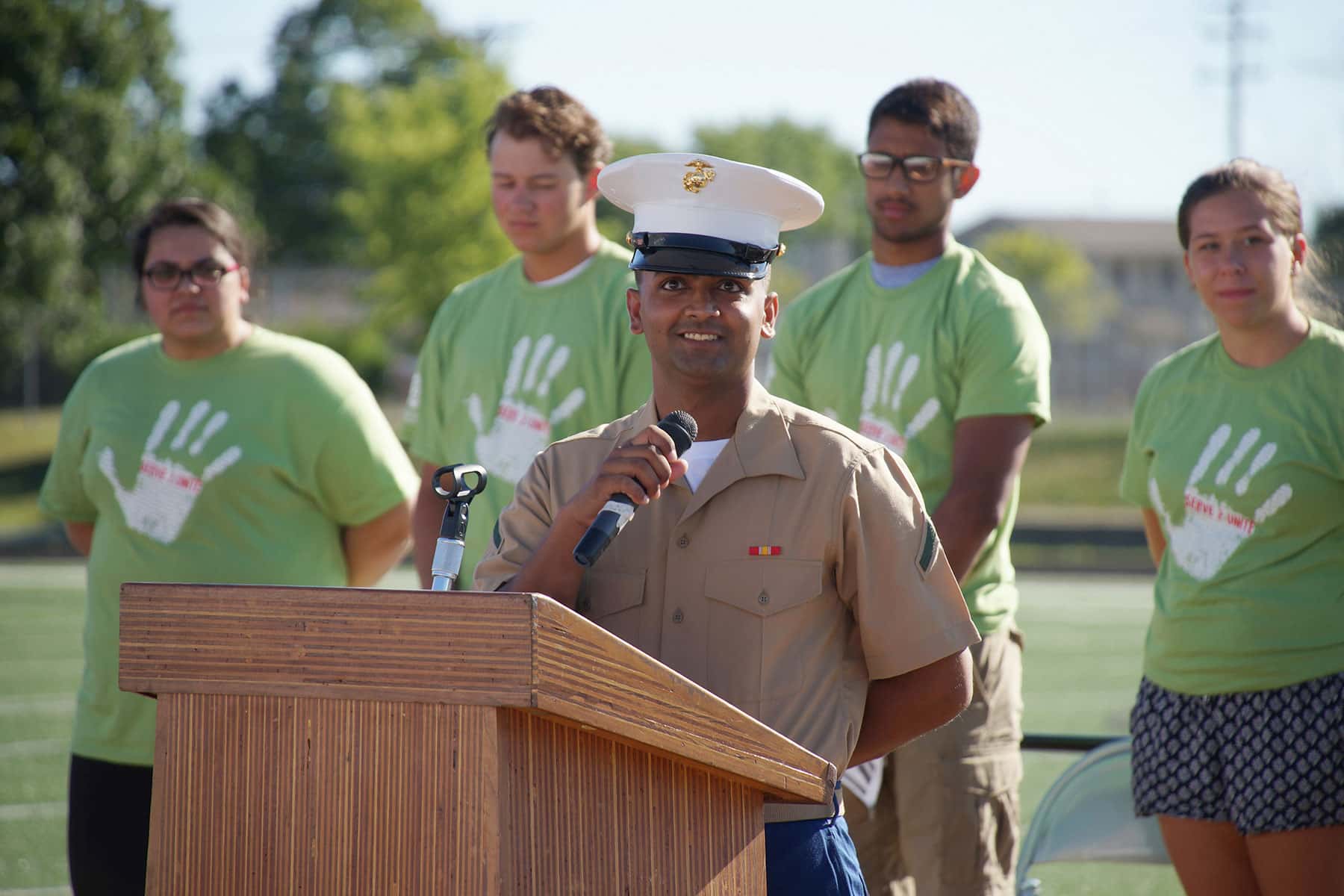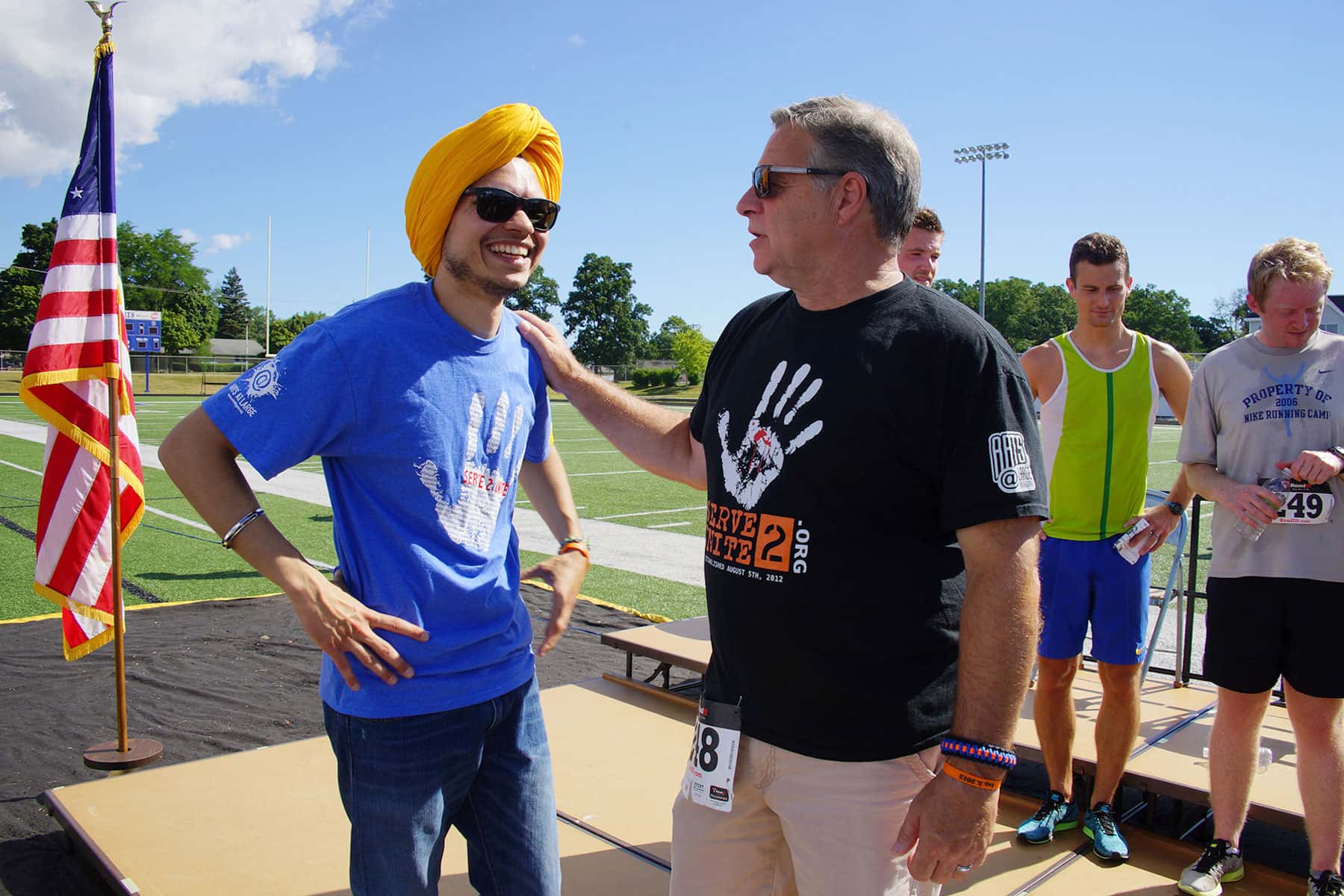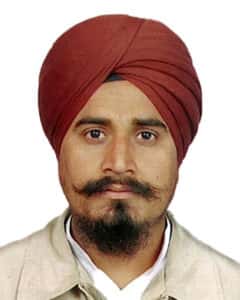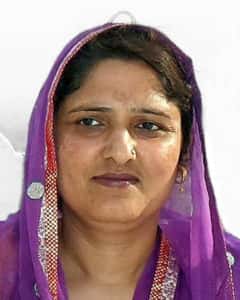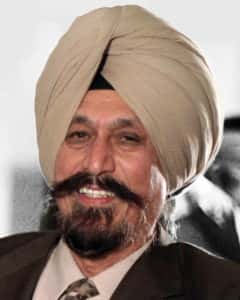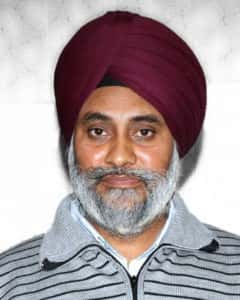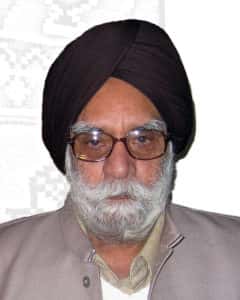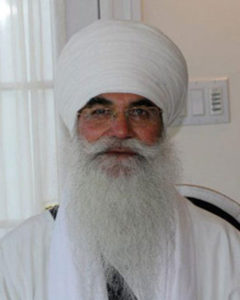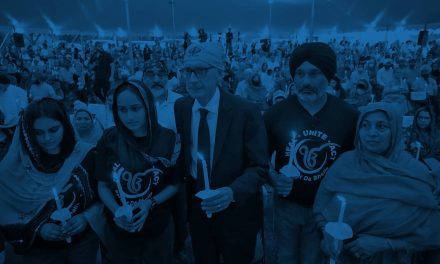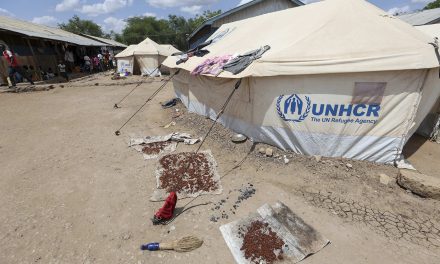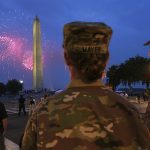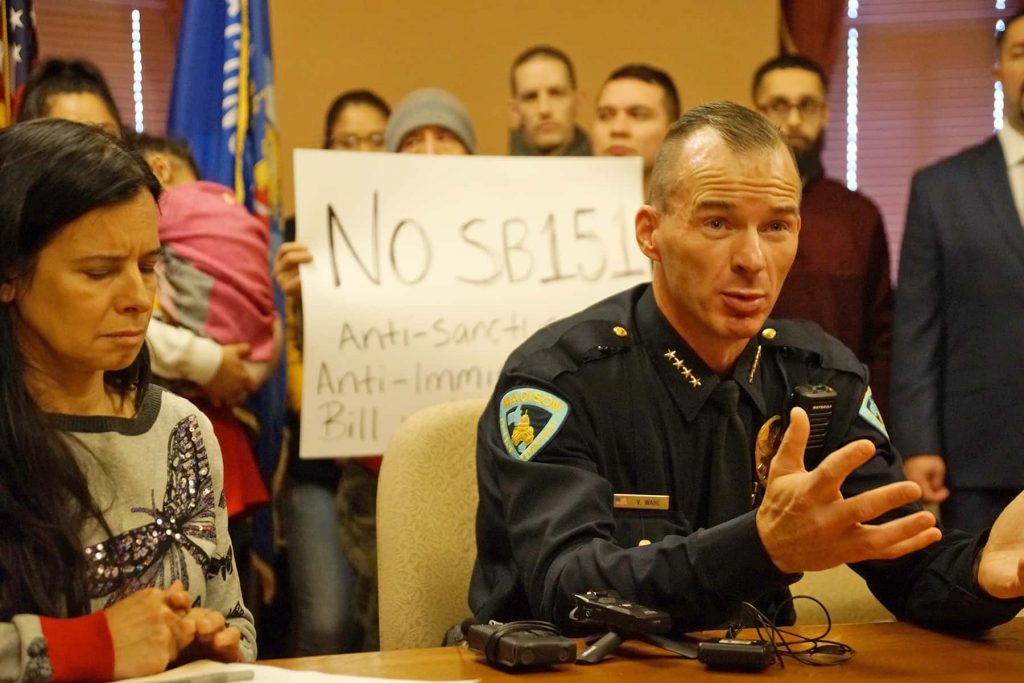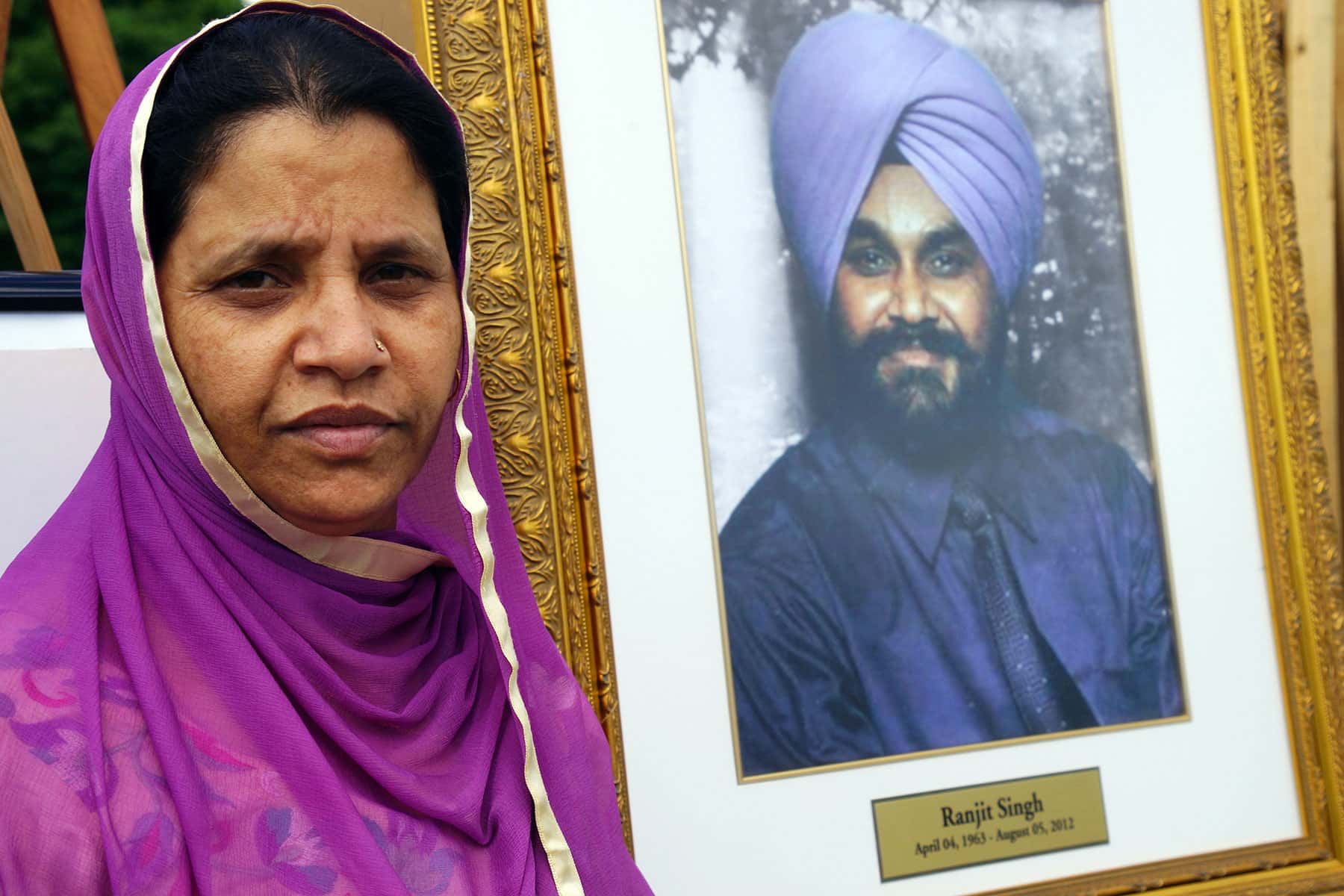
Honoring them begins by remembering their names. Suveg Singh Khattra, Satwant Singh Kaleka, Ranjit Singh, Sita Singh, Paramjit Kaur, and Prakash Singh all lost their lives at worship on a summer day in 2012.
Their names are not easy for the average person from the Midwest to pronounce. But each individual was part of the fabric and family of the Milwaukee community.
In memorial of these six members who died in the 2012 Sikh Temple of Wisconsin mass shooting, the fourth annual Chardhi Kala 6K Run/Walk was held on July 6 around the Oak Creek High School’s track & field. Each kilometer of the event commemorated one of the victims. It was also a day of celebration and participation, recognizing the diverse communities and closer ties that have grown together in Oak Creek as a result of the tragedy.
“The spirit of relentless optimism, Chardhi Kala, is a philosophy that empowers us to persevere and grow from hardship,” explained Rahul Dubey, a Sikh Temple member. “We are here in remembrance of the victims of 08.05.12. One of them, Satwant Singh Kaleka, was my godfather. And this gathering is our way to show love and support for all humanity of the world community.”
Charhdi Kala is a core condition of Sikhism. Especially during times of adversity, Sikhs are expected to exist in a positive state of mind. This attitude shows their contentment with the will of God. The remembrance of August 5, 2012 was expressed as going from tragedy to triumph, a philosophy that empowers the Sikh community to persevere and grow from hardship. It remains a continuous endeavor to drive out hate and fill that void with love and compassion in the community.
“We just want the public to know that Sikhs are normal people like them. We are your neighbors. We go to work, watch sports, and are normal Americans,” Gursher Singh, a Sikh Temple member. “If you visit our temple, you will find a friendly environment. So we hope that from this tragedy we can spread understanding.”
The Sikh temple in Oak Creek, known as the gurdwara, was the scene of a massacre on August 5, 2012. An American white supremacist and Army veteran from Cudahy, Wade Michael Page, fatally shot six people and wounded four others, one of whom has remained in a coma since that day. All of the dead were members of the Sikh faith, apart from Page who committed suicide.
Eric Holder, who was Attorney General of the United States at the time, described the incident as “an act of terrorism, an act of hatred, a hate crime.”
Because of their status as a largely immigrant community and minority religion, what happened to the Sikhs has not maintained public attention to the same extent as lesser tragedies.
“The massacre of 2012 was a tremendous shock to us. We had been living in Oak Creek, among the people here, and never expected such a thing to happen. Our faith is all about building relationships,” said Shauna Singh Baldwin. “Since then, we have become more forthcoming and explanatory of ourselves. We were much more internally focused by contrast with what we are today. We believe in doing outreach. For example, we have always fed the homeless. But now we are taking pictures of it, because we’ve never talked about it.”
Aside from individual hate crimes and a culture of intolerance that have affected the African American community of Milwaukee, no other ethnic group has suffered an act of terror like the Sikhs have. Within their community, many feel there is a double standard that goes beyond Milwaukee’s typical segregation issues. Foreigners who wear turbans and carry a ceremonial blade are viewed with suspicion, whereas Christians that can carry guns are deemed safe. It was one such individual who, in spite of his pledge to that faith, committed the terrible attack in Oak Creek.
“It will be very important for us to reaffirm once again that in this country, regardless of what we look like, where we come from, who we worship, we are all one people and we look after one other and we respect one another,” said President Barack Obama in 2012 when he originally offered his condolences to the Sikh community in Oak Creek.
Sikhs have been a part of the American population for more than 130 years. As British India was hit hard by mercantilism, many Sikhs emigrated at the end of the 19th century. Post 9/11, Sikhs have often been mistaken as Muslims or Arabs, and find themselves subject to hate crimes that surround Islamophobia.
“This event means the world to me, to see the kind of support that we’ve gotten over the last four years. Each year it has grown. And this is my first year as a Marine, so it’s extra special for me,” said Kamaljit Singh Saini, U.S. Marines and son of Paramjit Kaur.
Saini abruptly lost his mother, Paramjit Kaur, in 2012 and when he was finally old enough this past year he joined the Marine Corps to show his love and patriotism for America, the country that his mother also believed in.
Even though it is considered one of the youngest globally organized faiths, Sikhism is the fifth-largest religion in the world with over 25 million adherents. Originating in the Punjab region of South Asia during the 15th century, Sikhism is a monotheistic religion. Fundamental beliefs include faith and meditation on the name of the one creator, engaging in selfless service, and striving for social justice.
“I joined my friends in the Sikh community to commemorate the tragedy of August 5, 2012. The dialogue and healing embodied by the Chardhi Kala 6K Memorial Run and Walk serves as testament to a resilient and inspirational community that makes Milwaukee a greater place each day,” said John Chisholm, Milwaukee County District Attorney.
The son of one of the founding members of the Sikh Temple of Wisconsin, Navi Singh Gill, founded the Chardhi Kala 6K event and was also co-founder of the event sponsor, Serve2Unite. Mayor Steve Scaffidi of Oak Creek officiated the race and awarded medals to the winners at a short but inspiring ceremony. This was the second year that the event hosted the Chardhi Kala Blood Drive, operated by the Blood Center of WI. The Veterans Outreach of Wisconsin also accepted non-perishable food donations.
“In remembering, in uniting each August, in saying the names of those taken away so abruptly, we’re standing firm in our commitment to prevent another calamity of gun and hate violence from tearing apart the bonds of our family and our country. By being here today, we create a more inclusive and safe community,” said keynote speaker, Deepa Iyer, and author of We Too Sing America.
Timeline: Acts of Terrorism in Milwaukee
According research by the Wisconsin Historical Society, Milwaukee has a long history of incidents defined as home-grown terrorism by the U.S. government under statue 28 C.F.R. Section 0.85(l). These actions, conducted by various groups and individuals, show that our age is not unique to the terrible act that occurred on August 5, 2012.
September 26, 1969 – Vietnam War protesters bomb draft offices in Milwaukee.
August 29, 1967 – Milwaukee racists attack civil rights marchers and burn their offices.
August 9, 1966 – KKK bombers blow up the NAACP headquarters in Milwaukee.
November 21, 1917 – Anarchist bombs cause the death of 10 people in Milwaukee.
October 12, 1912 – Theodore Roosevelt is shot in Milwaukee.
May 1, 1886 – National Guard troops cause the death of five unarmed demonstrators in Bay View.
September 7, 1861 – An innocent African American man is lynched in Milwaukee.
Remembering 08.05.12
On August 05, 2012 Oak Creek suffered a tragedy when the Sikh Temple of WI was attacked in an act of hate by a White Supremacist who shot 10 people. When the rampage was over, 6 worshipers had lost their lives and 3 were seriously injured. The incident ended when the lone gunman committed suicide.
Ranjit Singh
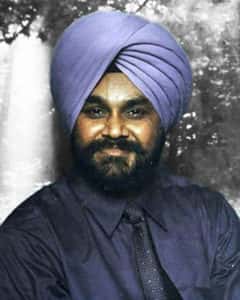
April 04, 1963 – August 05, 2012 (Age 49)
Ranjit Singh was born in the village of Dalu Wala, Punjab. He had two brothers, one of whom was Sita Singh, and two sisters. He moved to New Delhi after completing his education. He then subsequently moved to the United States in 1997.
Ranjit Singh is survived by his wife, Lokinder Kaur, and three children, Jasbeer Kaur, Jaspreet Kaur, and Gurvinder Singh. His son, Gurvinder Singh, was only seven months old when Ranjit Singh left their home in India for better life in the United States. He was hoping to return to India for the first time in November 2012 in time for Diwali celebration.
Besides working at the Sikh Temple, Ranjit Singh worked odd jobs on the weekdays to send money back to his family in India. He wanted to a secure bright future for his family. He will be remembered as a humble and hard-working man.
Prakash Singh
November 1, 1972 – August 05, 2012 (Age 39)
Prakash Singh was born in New Delhi, India. He was part of a family of four brothers and one sister. He had moved to the United States in 2005 from New Delhi, India.
Prakash Singh had been a priest at the Sikh Temple of Wisconsin for about 7 years. He had received his green card in the early part of 2012. He had gone to India in June 2012, and had returned with his wife, Ravinder Kaur, son, Prabhjot Singh, and daughter, Palmeet Kaur. He was preparing to move to an apartment with his family within the next week or so before the shooting.
Paramjit Kaur
April 25, 1971- August 05, 2012 (Age 41)
Paramjit Kaur was the only woman killed in the shooting. She is survived by her husband, Inderjit Singh Saini, and two sons, Kamaljit Singh Saini and Harpreet Singh Saini. She had recently returned from a trip to India with her sons, where they had visited Harmandir Sahib (Golden Temple) in Amritsar, Punjab. This was her first trip to India since arriving in America in 2004.
She was a weekly presence at the Gurdwara, as her faith stemmed deep in the Sikh religion. She came to pray and serve every Sunday and Thursday. She greatly valued education, and wanted to ensure her sons’ made use of the educational opportunity here. She was a very selfless woman, always putting her husband and sons first before anything.
Satwant Singh Kaleka
June 02, 1947 – August 05, 2012 (Age 65)
Satwant Singh Kaleka was born in the city of Patiala in the northern state of Punjab, India. He was born into a large family of nine brothers and sisters. They played together as children, and remained close throughout life. He fondly remembered that his extended family was always considered an immediate family. He would chuckle and say, that’s why we have the largest family on Earth, and we’re lucky for that. He made his living as a farmer in India.
Satwant Singh immigrated to America in 1982 after being sponsored by his elder brother, Dr. Jagjit Singh Kaleka, who was practicing Veterinary medicine in Wisconsin. He immigrated with his two sons, Pardeep Singh and Amardeep Singh, and wife, Satpal Kaur. He worked long hours at a gas station to make ends meet. By 1987, he had saved up enough money to buy a small gas station. With help from his family, the business ran with great success. In 1993, he bought his current house in Greenfield, Wisconsin. His initial order of business was to plant an American flag on the front lawn. The flag stood triumphantly throughout the years.
Satwant Singh, along with several other community members, organized their savings to start the Sikh Temple of Wisconsin in 1997. From its beginning until August 5, 2012, he served as its leader and president. He spent countless hours at the Gurdwara maintaining the facilities, helping run the daily services, and offering a helping hand to anyone in the congregation.
Satwant Singh Kaleka is survived not only by his wife, and two sons, but by every life he ever touched – his in-laws, his friends, his Sikh community, his neighbors in Milwaukee – even today, as his soul has crossed over to the other side.
Sita Singh
November 15, 1970 – August 05, 2012 (Age 41)
Sita Singh was born in the village of Dalu Wala, Punjab. He was the younger brother of Ranjit Singh, another victim of the shooting. He was part of a family of five children.
Sita Singh moved to New Delhi after completing his education. Prior to moving to the United States in 1995, he lived in Canada and England. He moved to the Sikh Temple only six months before the shooting.
Sita Singh is survived by his wife, Surinder Kaur, and four children, Sarabjeet Kaur, Harmeet Singh, Kamaljeet Kaur, and Jasbir Singh. He was a very dedicated Sikh, who selflessly attended to all duties at the temple, including daily services, maintenance, and cooking. He was also very fond of music and reading.
Suveg Singh Khattra
June 6, 1928 – August 05, 2012 (Age 84)
Suveg Singh Kattra was born in the city of Ambala in the northern state of Haryana, India. He was the oldest victim in the shooting. He was part a large family of three brothers and three sisters. He had made his living in India by farming. He had immigrated to the United States in 2004 with his wife, Nachittar Kaur, to live with their son, Baljinder Singh Khattra, and daughter-in-law, Kulwant Kaur. His wife had unfortunately passed away in 2010.
Suveg Singh is survived by his five children and seven grandchildren. He held a key role at the Sikh Temple, as he provided companionship by asking members of the congregation about their families, and offering uplifting scripture passages.
Suveg Singh was a strong and devout man, who was known to come to the Gurdwara early in the morning, and stay late through the evening. He will be remembered by those around him for his punctuality in everything he did.
Baba Punjab Singh
Baba Punjab Singh was critically injured during the attack and continues to require around-the-clock, long-term care at an inpatient rehabilitation center.
Punjab Singh traveled all over the world to share spiritual truths. He has taught about the oneness of all of life and the need to love and forgive. He was a visiting congregational leader on this August 5th day at the Oak Creek Gurdwara. Punjab Singh is not only a beloved leader; he is now a hospital patient. He is a treasure to all who have known him and his golden heart has impacted the lives of many through his teachings. This is true whether you knew Punjab Singh before or after the shooting.
Many staff members at the hospital have had the great opportunity to hear stories about Punjab Singh’s life as told by his family and the community who loves him. His two sons from India now live their lives in dedication to being present to the care of their father. They alternate staying with him on a nearly 24-hour basis. Punjab Singh’s wife is here from India as well. The American culture is one that is foreign to her as she does not speak the language, and she finds it difficult to understand some of the styles of interaction between people in this country. Punjab Singh’s two daughters live in India and are sadly only able to visit occasionally. Life becomes very strenuous when violence tears apart the fabric of the family and everyone’s life is now altered including extended family members. It is important to remember that we are all part of this extended family.
Raghuvinder Singh (Punjab Singh’s older son) has shared numerous stories about his father. This has helped us understand his father’s gentle nature and his deep connection to the Creator of all of life. Punjab Singh would sometimes sit in meditation without moving an inch for up to 14 hours at a time. While in meditation, Punjab Singh must have been in touch with an all-knowing view of the circumstances here on Earth. No matter where Punjab Singh was teaching in the world, he would call either of his sons by phone and tell them to go to certain homes in India. Punjab Singh would give instructions on what to take to the family in need. It might have been provisions or money. Often times, the sons were instructed to pay for school fees, school supplies and uniforms for needy families and orphans. The gift of education was a priority for Punjab Singh, and it was part of his life’s mission.
This whole experience has impacted the family in ways that one ever imagine. The new culture, the new environment, the pain of leaving family behind, the selling of their family business back home, and most of all their father’s health.
Prayer in a great thing! God does listen to prayers and does help those in need. Prayers from all over the world have helped improved Punjab Singh’s health. We urge everyone to keeping praying, pray for world peace, pray to end hate, pray to stop incidents like the recent shootings to stop. We thank everyone for the great support in this time of great need.
Read the article and view the photo essay that were produced as companion features for this news report.

